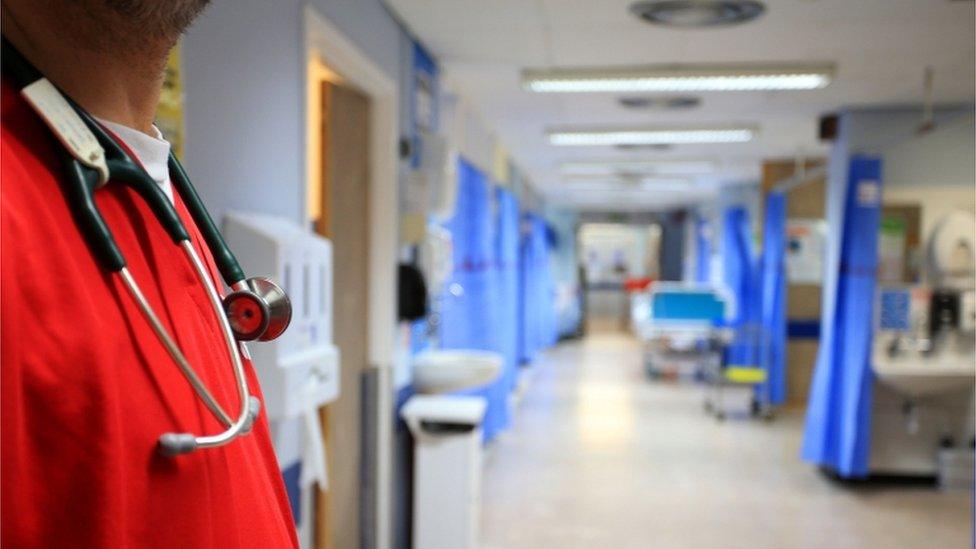Lockdown leads to increase in Scottish hospital waiting times
- Published

The health service in Scotland now faces a backlog of patients
The number of patients waiting more than 12 weeks for hospital treatment increased to more than 71,000 at the end of June.
That compared to fewer than 24,000 on the same date last year.
The Public Health Scotland figures, external show the impact of coronavirus on Scotland's health services.
Health boards were asked to suspend all non-urgent elective treatment in mid-March as the NHS was put on an "emergency footing".
It has led to a backlog of patients awaiting treatment in Scotland.
'Significant challenges'
The statistics show that:
45,116 people (excluding NHS Grampian) completed the journey from referral to treatment in June 2020, compared to 94,481 in the same month last year
63,600 waited longer than six weeks for a diagnostic test in the three months until the end of June - four times more than in same period in 2019
More than half (50.5%) of patients awaiting diagnostic tests at the end of June had waited more than 13 weeks, up from 5% in February
98,332 patients were waiting for tests like colonoscopies, MRI and CT scans - up by 11.4% since February 2020
The Scottish government said the figures reflected "significant operational challenges" for the NHS in Scotland during the pandemic.
Health Secretary Jeane Freeman, who announced this week that she will not seek re-election, said: "In recent weeks, health boards have been carefully resuming a wide range of services, but the ongoing need for additional infection prevention and control measures means each clinic or theatre session will see fewer patients.
"Those patients who require urgent, elective and vital cancer treatment have been, and will continue to be, prioritised."
She said she wanted the NHS to to be in a position to speed up mobilisation as soon as possible, while keeping patients and staff safe.
"As we continue to deal with the virus we have to continue to balance demands and pressures, making the best decisions we can: none of which are easy and none of which are taken lightly."
Patients undergoing non urgent operations are being asked to isolate for two weeks and take a Covid test before they are admitted.
The NHS Louisa Jordan has been enlisted to help clear the backlog of patients.
'It changes your life. You get very down about it'

Former nurse Eileen Wathew is among those waiting for treatment - she has arthritis and is waiting for a knee replacement operation.
She went to see a consultant in November last year, and was told it would take "two to three months" before she could be treated, but like many others she continues to wait.
With the wait, there comes growing pain in Eileen's right knee and a decrease in her mobility.
She said the lack of communication has added to her anxiety.
"It's the not knowing that is really difficult to deal with," she added.
"You get very down about it. Your mobility is getting worse - every day you're dealing with several different kinds of pain and it does get overwhelming.
"It would have been nice if we had been given more information - even just the fact that this is the situation. Just something to let me to hold on to," she said.
'Tackling the backlog'
Cancer Research UK said the report shows health services will need to continue to "rapidly adapt" and increase service capacity in order to clear the backlog and prevent more suspected cancer cases mounting up.
Head of external affairs Marion O'Neill said: "The introduction of infection control measures means that providing cancer services has become more time and resource intensive.
"Tackling the backlog of those waiting for tests will require more workforce, more equipment and the adoption of other innovations that release capacity into the system."
The Scottish Conservatives urged ministers to "implement an urgent treatment recovery plan to get our NHS back up to full capacity".
Health spokesman Donald Cameron said; "While the coronavirus pandemic goes a long way in explaining why there was such a sharp fall over this period, this staggering drop in numbers suggests that there are a lot of patients still going without treatment.
"This isn't just storing up problems - there will be people across Scotland waiting, in pain, right now. It was understandable to divert people away from the NHS at the height of the Covid crisis, but that is no longer the case."
Scottish Labour also criticised the Scottish government.
Monica Lennon, its health and care spokeswoman, said ministers "were failing to deliver timely healthcare before coronavirus and locking down the NHS without a plan to restart it has exacerbated this crisis, leading to unthinkable waiting times.
"With thousands of Scots waiting for key tests and languishing for months without treatment it is vital a plan to fully kickstart and support our NHS is implemented."